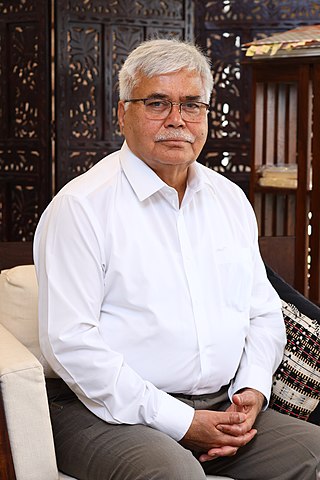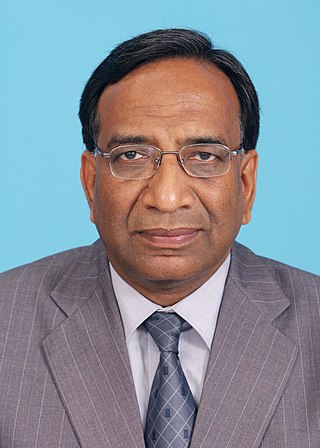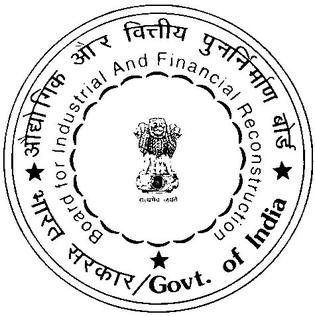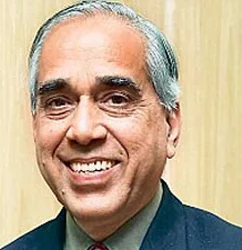India's telecommunication network is the second largest in the world by number of telephone users with over 1.1 billion subscribers as of December 2023. It has one of the lowest call tariffs in the world enabled by multiple large-scale telecom operators and the ensuant hyper-competition between them. India has the world's second largest Internet user-base with over 904 million broadband internet subscribers as of December 2023.

The Telecom Regulatory Authority of India (TRAI) is a regulatory body set up by the Government of India under section 3 of the Telecom Regulatory Authority of India Act, 1997. It is the regulator of the telecommunications sector in India. It consists of a chairperson and not more than two full-time members and not more than two part-time members. The TRAI Act was amended by an ordinance, effective from 24 January 2000, establishing a Telecom Disputes Settlement and Appellate Tribunal to take over the adjudicatory and disputes functions from TRAI.
Jagdish Khattar was an Indian businessman and civil servant. He was the managing director of Maruti Udyog Limited from 1999 to 2007. He first joined Maruti in July 1993 as a director (marketing). He was appointed managing director in 1999 as the government nominee, and reappointed in May 2002 as the Suzuki Motor Corporation (SMC) nominee. During his tenure, he oversaw a restructuring of the company in the face of foreign competitors entering the Indian market.
Narendra Kumar Patni was an entrepreneur and IT visionary who founded Patni Computer Systems and helped establish the overall Indian IT industry. He is considered a "pioneer of India's information technology (IT) services revolution" and a "doyen of the industry" Patni was listed in the Forbes list of India's 40 Richest in 2005.
The Indian Telecommunication Service, widely known as ITS, and earlier known as Telegraph Engineering Service Class I is one of the Central Civil Services under Group 'A' of the executive branch of the Government of India. The appointment to this service is done through Combined Engineering Services Exam held every year by Union Public Service Commission (UPSC) of India. The service was created to meet the techno managerial needs of the government in areas related to telecommunications. The Department of Telecommunications (DoT) had been managed for years by the officers of this permanent cadre, called the Indian Telecommunications Service (ITS). The officers of ITS work under restrictions and rules of Central Civil Services (Conduct) rules.

Ram Sewak Sharma is a retired Indian bureaucrat and former civil servant. He is currently a Distinguished Visiting Professor at the Indian Institute of Technology, where he teaches Technology and Policy. He also serves as the non-executive Chairperson of Open Network for Digital Commerce (ONDC), a non-profit organisation aimed at fostering digital commerce.

Pradeep Kumar is a former Indian Administrative Service (IAS) officer, 1972 batch, of the Haryana cadre, who served as Defense Secretary, in the Ministry of Defence, Government of India, for a term of two years, from August 2009 to July 2011. He succeeded Vijay Singh, IAS, 1970 batch, who, on superannuation, was appointed as member of the UPSC. In July 2011, on superannuation, he was appointed as chief vigilance commissioner of India.
The Telecommunications Dispute Settlement and Appellate Tribunal (TDSAT) was established to adjudicate disputes and dispose of appeals with a view to protect the interests of service providers and consumers of the Indian telecommunications sector and to promote and ensure its orderly growth.
The National Customer Preference Register (NCPR), formerly the National Do Not Call Registry (NDNC), is intended to give Indian consumers an opportunity to limit the telemarketing calls they receive. The Telecom Regulatory Authority of India (TRAI) is the Indian governmental agency tasked with defining various policies and regulations for wireless communication service providers in India. As per TRAI regulation, every mobile service provider in India is required to set up a National Customer Preference Register (NCPR). In practice, various service providers refer to it as the Do Not Disturb (DND) registry. Telemarketers, after registration from TRAI, receive permission to access the NCPR.

The Board for Industrial and Financial Reconstruction (BIFR) was a development finance institution under the ownership of Ministry of Finance, Government of India, part of the Department of Financial Services of the Ministry of Finance. Set up in January 1987 by the Rajiv Gandhi government, its objective was to determine sickness of industrial companies and to assist in reviving those that may be viable and shutting down the others. On 1 December 2016, the Narendra Modi government dissolved BIFR and referred all proceedings to the National Company Law Tribunal (NCLT) and National Company Law Appellate Tribunal (NCLAT) as per provisions of Insolvency and Bankruptcy Code.
The Advisor, TRAI is the head of different divisions in the Telecom Regulatory Authority of India (TRAI).The advisors are in the rank and pay of Joint Secretaries to Government of India. The advisors look into the ten functional divisions, namely Mobile Network, Interconnection & Fixed Network, BroadBand and Policy Analysis, Quality of Service, Broadcasting & Cable Services, Economic Regulation, Financial Analysis & IFA, Legal, Consumer Affairs & International Relation and RE & Administration & Personnel.Officers are selected from the premier Indian Administrative Service and Indian Revenue Service and also from the Indian Telecommunication Service as well as the Indian Economic Service.
Rahul Khullar was an IAS officer of the 1975 batch and a former chairman of the Telecom Regulatory Authority of India (TRAI).

Nripendra Misra is an Indian bureaucrat and civil servant. An Indian Administrative Service (IAS) officer of the 1967 batch from the Uttar Pradesh cadre, he served as the Principal Secretary to the Prime Minister of India, Narendra Modi from 2014 to 2019. He earlier served as the chairperson of the Telecom Regulatory Authority of India, as the Telecom Secretary of India and the Fertilizers Secretary of India. He was awarded India's third highest civilian award the Padma Bhushan in 2021. His son Saket Misra is a nominated Member of Legislative Council in Government of Uttar Pradesh since April 2023.
Mechanisms for establishing rules ensuring net neutrality in India, are at present mainly enforced by the Telecom Regulatory Authority of India (TRAI). At present, there are no specific legislation regarding Net Neutrality in India.

Nikhil Pahwa is an Indian journalist, digital rights activist, and founder of MediaNama, a mobile and digital news portal. He has been a key commentator on stories and debates around Indian digital media companies, censorship and Internet and mobile regulation in India.

Anil Baijal is a retired Indian Administrative Service (IAS) officer and served as the 21st Lieutenant Governor of Delhi. He took over office on 31 December 2016 after the sudden resignation of Najeeb Jung. He resigned from the post of Lieutenant Governor and sent his resignation letter to President of India on 18 May 2022 as his term was over.

Republic TV is an Indian right-wing conservative English-language news channel, launched on 6 May 2017, operated and owned by Republic Media Network co-founded by Arnab Goswami and Rajeev Chandrasekhar. It headquarters are in Mumbai, India. Republic Media Network consists 3 other channels, Republic Bharat, Republic Bangla, Republic Kannada. It has been criticised for reporting in favor of the ruling BJP and for spreading disinformation on multiple occasions.
Abhay Karandikar is an Indian educator, engineer, innovator, and administrator best known for his work in the telecommunication sector in India. Currently, he is serving as the Secretary to the Government of India in the Department of Science and Technology, Government of India from 1 October 2023 onwards. Previously, he served as the Director of Indian Institute of Technology, Kanpur from 1 April 2018 to 30 September 2023. Prior to that, Karandikar held a number of positions, including Dean, Head of the Department of the Electrical Engineering, and Institute Chair Professor at the Indian Institute of Technology, Bombay. He was one of the founding members of Telecom Standards Development Society of India and appointed as its first Vice Chairman from 2014 to 2016, and then was appointed its Chairman from 2016 to 2018. Karandikar contributed to conceptualization and establishment of new technical standards work programmes for TSDSI. In 2016, he was awarded with IEEE SA's Standards Medallion for his work to Indian Technology, Policy and Standardization with IEEE guidelines.







